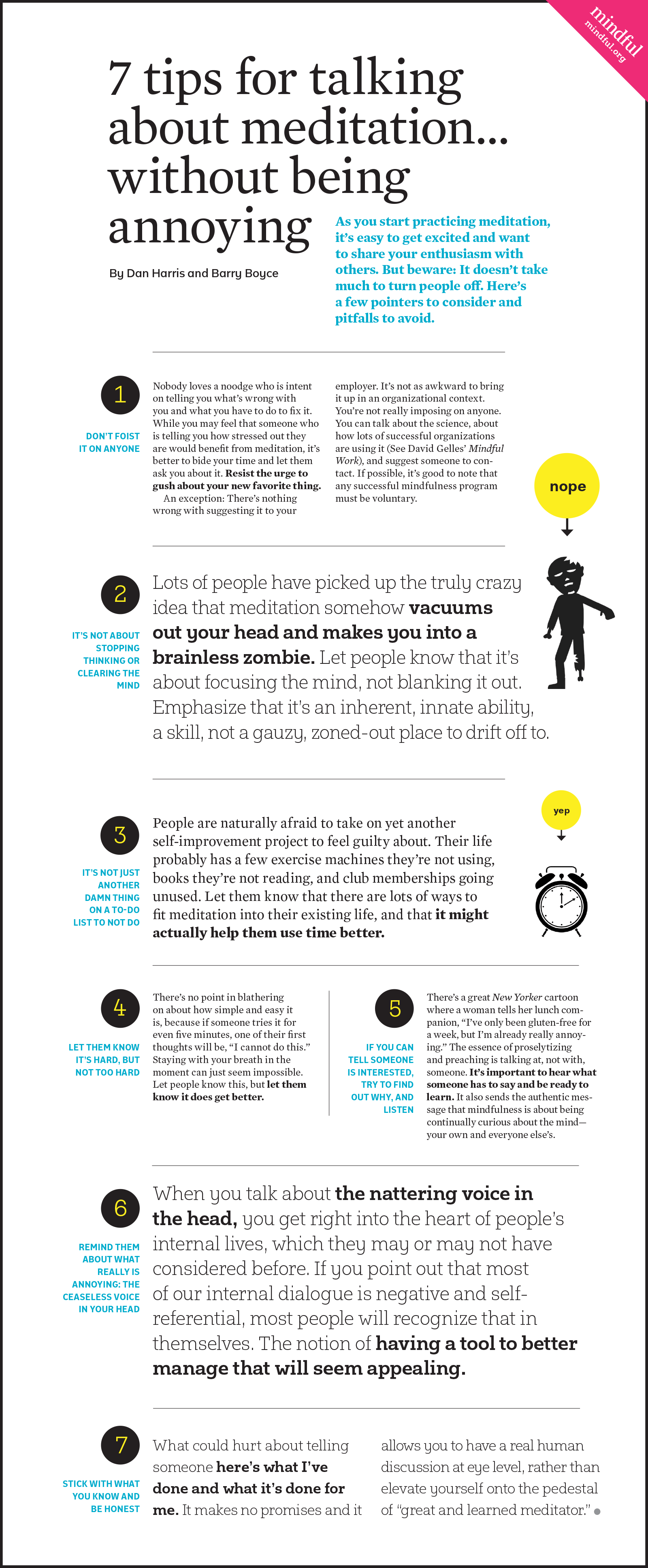
1. Don’t foist it on anyone
Nobody loves a noodge who is intent on telling you what’s wrong with you and what you have to do to fix it. While you may feel that someone who is telling you how stressed out they are would benefit from meditation, it’s better to bide your time and let them ask you about it. Resist the urge to gush about your new favorite thing.
An exception: There’s nothing wrong with suggesting it to your employer. It’s not as awkward to bring it up in an organizational context. You’re not really imposing on anyone. You can talk about the science, about how lots of successful organizations are using it (See David Gelles’ Mindful Work), and suggest someone to contact. If possible, it’s good to note that any successful mindfulness program must be voluntary.
2. It’s not about stopping thinking or clearing the mind
Lots of people have picked up the truly crazy idea that meditation somehow vacuums out your head and makes you into a brainless zombie. Let people know that it’s about focusing the mind, not blanking it out. Emphasize that it’s an inherent, innate ability, a skill, not a gauzy, zoned-out place to drift off to.
3. It’s not just another damn thing on a to-do list to not do
People are naturally afraid to take on yet another self-improvement project to feel guilty about. Their life probably has a few exercise machines they’re not using, books they’re not reading, and club memberships going unused. Let them know that there are lots of ways to fit meditation into their existing life, and that it might actually help them use time better.
4. Let them know it’s hard, but not too hard
There’s no point in blathering on about how simple and easy it is, because if someone tries it for even five minutes, one of their first thoughts will be, “I cannot do this.” Staying with your breath in the moment can just seem impossible. Let people know this, but let them know it does get better.
5. If you can tell someone is interested, find out why, and listen
There’s a great New Yorker cartoon where a woman tells her lunch companion, “I’ve only been gluten-free for a week, but I’m already really annoying.” The essence of proselytizing and preaching is talking at, not with, someone. It’s important to hear what someone has to say and be ready to learn. It also sends the authentic message that mindfulness is about being continually curious about the mind—your own and everyone else’s.
6. Remind them about what really is annoying: the ceaseless voice in your head
When you talk about the nattering voice in the head, you get right into the heart of people’s internal lives, which they may or may not have considered before. If you point out that most of our internal dialogue is negative and self-referential, most people will recognize that in themselves. The notion of having a tool to better manage that will seem appealing.
7. Stick with what you know and be honest
What could hurt about telling someone here’s what I’ve done and what it’s done for me. It makes no promises and it allows you to have a real human discussion at eye level, rather than elevate yourself onto the pedestal of “great and learned meditator.” •






